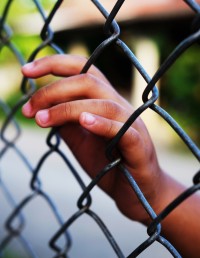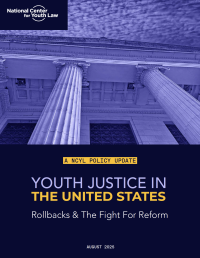Legislative Push for Juvenile Justice Reform in California
The National Center for Youth Law is working with California State Senators Ricardo Lara and Holly Mitchell on a legislative package that seeks to interrupt the School-to-Prison-Pipeline and reduce the number of young people in the juvenile and adult criminal systems.
In introducing their legislative package Senators Lara and Mitchell cited brain research that demonstrates children are different from adults and should be treated appropriately for their age, level of development, and ability to change. The bills are intended to put greater emphasis on prevention, rehabilitation and maintaining family cohesion.
In this spirit NCYL is co-sponsoring three bills in this legislative reform effort:
Senate Bill (SB) 439 establishes a minimum age of jurisdiction for the juvenile system. This bill would exclude children age 11 and younger from juvenile court prosecution.
SB 395 protects the Miranda rights of youth in custodial interrogations by requiring youth under the age of 18 to consult with legal counsel before they waive their constitutional rights
SB 394 brings California into compliance with the intent of the Supreme Court’s Montgomery v. Louisiana decision that juveniles cannot be sentenced to life without parole without a meaningful opportunity for release that considers how youth differ from adults.
Numerous scientific studies, court decisions and experience have demonstrated that children are less culpable than adults for the same acts, and are also less able to meaningfully navigate justice system processes, including working with their own attorneys. Moreover, system involvement can have lasting and negative psychological and health impacts on children. Ultimately, the needs underlying their alleged offenses are better addressed through alternatives to prosecution, including through child welfare, education, health care or human services.
SB 439 would exclude children 11 years old and younger from prosecution in juvenile court. The bill would protect young children from the negative impacts of formal justice system involvement, promote their rights, health, and well-being through alternative child-serving systems, and decrease the amount of resources wasted in the juvenile justice system.
Although existing California law assures counsel for youth accused of crimes, the law does not require law enforcement to recognize that youth are different from adults nor to ensure a youth understands their rights before waiving them. Studies have shown young people often do not fully comprehend the consequences of waiving their rights. They are also much more likely than adults to waive their rights and to confess to crimes they did not commit. SB 395 will require youth under 18 to consult with counsel prior to waving their rights.
In a 2012 case, Miller v. Alabama, the U.S. Supreme Court recognized adolescents’ “diminished culpability and heightened capacity for change”i and ruled that mandatory life sentences without the possibility of parole for those who committed their crimes before the age of 18 are unconstitutional.ii The court in Montgomery v. Louisiana, reaffirmed that children are less culpable than adults because of their unique immaturity, impulsiveness, vulnerability, and capacity for redemption and rehabilitation. Under SB 394 a person who received a life sentence without the possibility of parole for a crime committed before he or she was 18 years of age ,will be eligible for parole through a youth parole hearing during his or her 24th year of incarceration, that takes into consideration how young people are different from adults and their subsequent growth and maturation.
[i]Echoing its earlier cases Roper v. Simmons (2005) and Graham v. Florida (2010)
[ii] 132 S. Ct. 2455 (2012).






